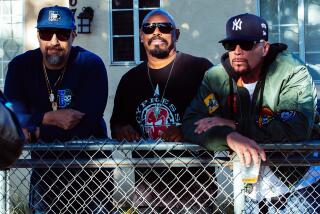PBS Plays Out the Debate Over the Bard
- Share via
“Frontline,” the excellent PBS documentary series customarily anchored by Judy Woodruff, departs from its usual diet of world crises tonight to contemplate “The Shakespeare Mystery” (9 p.m. on Channels 28 and 15, 10 p.m. on Channel 50.
The program is television’s most elaborate exploration yet of the Authorship Question: Did the man from Stratford-Upon-Avon write the finest body of plays and poems in the English language, or was it a person or persons unrecognized or denied by 300-plus years of Shakespeare scholarship?
It is an inventive, balanced and engrossing look at the world’s greatest literary mystery--not least because a sizable body of believers are sure there is no mystery at all.
Specifically, guest anchor Al Austin asks, was the unknown party Edward de Vere, the 17th Earl of Oxford? De Vere was first advanced as a claimant in 1920, after years of literary detective work by an English schoolmaster named Thomas Looney, in a book he called “ ‘Shakespeare’ Identified.”
The author of the plays knew law, languages, classical literature, botany, falconry, Italy (De Vere had been there; Shakespeare hadn’t) as well as life in the royal court, seen from inside. The man from Stratford left no books, no mention of his works, and his death occasioned nothing more than an entry in the parish registry.
Doubts about the Stratford man arose as early as the 18th Century. Francis Bacon was an early alternative favorite, along with Christopher Marlowe and even Queen Elizabeth, who wrote splendid sonnets.
The question has been newly fueled by “The Mysterious William Shakespeare,” the most detailed presentation of the Oxford case since Looney’s own, published in 1984 by Charlton Ogburn, a former State Department official and author. The Stratford-De Vere case has been debated in mock trials before three Supreme Court justices in Washington and three law lords in England. The Stratford man won both, although the Oxfordians consoled themselves that their case can no longer be rejected out of hand.
But as the documentary demonstrates, in academia the debate is neither polite nor civil. The principal Stratfordian witnesses, the American scholar Samuel Schoenbaum and British historian A. L. Rowse, are scornfully dismissive. “Lunatic rubbish,” says Schoenbaum; “bloody fools,” snorts Rowse of the advocates for Oxford and all other claimants.
Neither attempts to refute the circumstantial evidence supporting the Oxford case. De Vere, one of the premiere lords of England and a close friend of Elizabeth, was a poet, some of whose work in his own name survives; a contemporary also called him “the best we have in comedy” as a playwright, although none of the plays exist--at least under the De Vere signature.
The program, produced and directed by Kevin Sim, with Nick Rosen as associate producer, was made by “Frontline” in conjunction with Yorkshire Television. It works hard to make the debate lively and visual, commencing with footage from the bridge of a Mississippi river boat and a voice-over reciting some of Mark Twain’s essay “Is Shakespeare Dead?” Twain caught his love of Shakespeare from a captain who interspersed commands with fragments of poetry in a wonderful stream (or river) of consciousness.
Twain, an early doubter about the Stratford authorship, along with Henry James and Sigmund Freud, judged that Francis Bacon probably wrote the plays. But Twain was mostly at pains to disprove that the man from Stratford wrote anything but the un-Shakespearean quatrain on his gravestone about leaving his bones alone.
“Frontline” presents relevant snippets from the plays. (Was De Vere giving clues to himself?) There are glimpses of the Shakespeare industry in Stratford, including the grammar school he may or may not have attended.
Among the pro-Oxford interviewees are Ogburn himself and young Charles Vere, one of Oxford’s descendants who has started an active Oxford Society in England.
Ogburn, frail after illness, speaks movingly of the anguish De Vere must have felt that his life’s work might never be recognized as his own because of his need to present it pseudonymously, or behind a front, as in blacklist days.
But the imposture, and the need for it, is the chief weapon the loyal Stratfordites use against all the alternate claimants. The Oxfordian argument is that De Vere as a high courtier and close ally of the queen (although she threw him in the Tower for impregnating one of her ladies-in-waiting) could not be seen to be writing about royal matters.
The history plays justify Elizabeth’s own claims to the throne and more generally support the idea of kingship and queenship.
Twain concluded that if the Stratford man “had been less intemperately solicitous about his bones and more solicitous about his Works, it would have been better for his good name and a kindness to us. The bones were not important. They will moulder away, they will turn to dust, but the Works will endure until the last sun goes down.”
“There are certain things that defy rational explanation,” Schoenbaum says. “There is something incomprehensible about genius. Shakespeare was superhuman.”
Anchorman Austin sums it up nicely: “Those who believe De Vere was Shakespeare must accept an improbable hoax as part of it, a conspiracy of silence involving, among others, Queen Elizabeth herself. Those who side with the Stratford man must believe in miracles.”
More to Read
The complete guide to home viewing
Get Screen Gab for everything about the TV shows and streaming movies everyone’s talking about.
You may occasionally receive promotional content from the Los Angeles Times.






